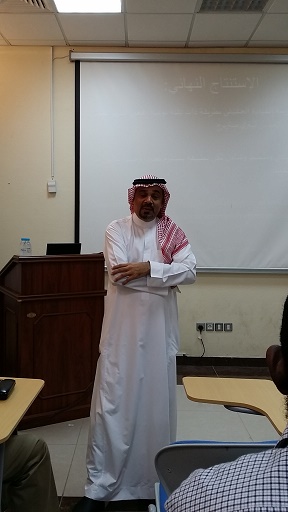
In order to utilize the expertise of staff members, transfer their knowledge and develop their abilities to benefit from the different specialties, the College of Public Health and Health Informatics, Umm Al-Qura University (UQU), held a lecture titled, “The Five Minds of a Manager: Henry Mintzburg's Framework” on Monday, 19th Muharram 1439H (9th October 2017). The lecture was presented by Prof. Dr. Zaki Shaker Siddiqi, Chemistry Professor at the College’s Department of Environmental Health. In addition, it was attended by Dr. Waheeb bin Dakhilullah Al-Harbi, Dean of the College, as well as the department heads and many staff members from the various departments at the College.
Prof. Siddiqi started the lecture with a short introduction about the impasse in which the leadership-obsessed self-development schools in the West and the East were engaged, and the question of whether institutional leadership or behavioral schools had been proposed.
Then, Prof. Siddiqi demonstrated one of the slightly different models, i.e. “The Five Minds of a Manager: Henry Mintzburg's Framework.” He explained that it was a comprehensive and clear framework of wise leadership and management, addressing the mindset of the influential leader. He added that it differed from the majority of other common management models, which were flawed by being either deeply-rooted in theory or based on the traits, skills and behaviors of the leader (do / do not).
In the same context, Prof. Siddiqi clarified that such frame comprised five mind-sets that should be found in a leader: the reflective mind-set (self), the analytic mind-set (organizations), the worldly mind-set (context), the collaborative mind-set (relationships) and the action mind-set (change).
The reflective mind-set (managing self) means that what managers desperately need these days is to stop and think—to step back and reflect thoughtfully on their experiences. They should pay attention to the underlying intention and values behind their actions, and evaluate their personalities in terms of care for and growth of subordinates.
The analytic mind-set (managing organizations) concentrates on synthesis and consideration of “soft data,” namely consideration of the feelings and conditions of others and interaction with them before making decisions.
The worldly mind-set (managing context) cares for dealing and integrating with others, collective mentality, and collective development where the individual cooperates with the community for public and private benefit. An example is the African model: UBUNTU. On the other hand, the collaborative mind-set (managing relationships) tends to regard the employees as the end rather than the means to achieve the objectives of the institution.
Finally, the action mind-set (managing change) is interested in choosing the right model for the organization that suits the employees, and working to build the correct institutional culture. It was suggested to use appropriate models, rather than these days’ fashion, such as Eetsco, Skatima, Peter Singh, Donald Shawn, Chris Ergris, and Edgar Sheen for listening and conversation. Moreover, the role of human resources and the transformation of non-skilled training into real development should be reconsidered.
At the end of the lecture, Prof. Siddiqi concluded with the following points: